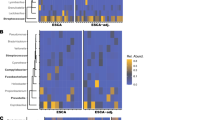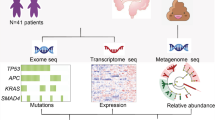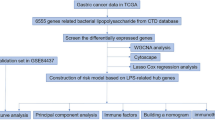Abstract
Purpose
Plasmalemma vesicle-associated protein (PLVAP) is involved in many immune‑related signals; however, its role in stomach adenocarcinoma (STAD) remains to be elucidated. This study investigated PLVAP expression in tumor tissues and defined the value in STAD patients.
Methods
A total of 96 patient paraffin-embedded STAD specimens and 30 paraffin-embedded adjacent non-tumor specimens from the Ninth Hospital of Xi’an were consecutively recruited in analyses. All RNA‑sequence data were available from the Cancer Genome Atlas database (TCGA). PLVAP protein expression was detected using immunohistochemistry. Microbial community analysis was performed by 16S rRNA gene sequencing using Illumina MiSeq. PLVAP mRNA expression was explored with the Tumor Immune Estimation Resource (TIMER), GEPIA, and UALCAN databases. The effect of PLVAP mRNA on prognosis was analyzed via GEPIA, and Kaplan–Meier plotter database. GeneMANIA and STRING databases were used to predict gene/protein interactions and functions. The relationships between PLVAP mRNA expression and tumor-infiltrated immune cells were analyzed via the TIMER and GEPIA databases.
Results
Significantly elevated transcriptional and proteomic PLVAP expressions were found in STAD samples. Increased PLVAP protein and mRNA expression were significantly associated with advanced clinicopathological parameters and correlated with shorter disease-free survival (DFS) and overall survival (OS) in TCGA (P < 0.001). The microbiota in the PLVAP-rich (3+) group was significantly different from that in the PLVAP-poor (1+) group (P < 0.05). The results from TIMER showed that high PLVAP mRNA expression had significant positive correlations with CD4 + T cell (r = 0.42, P < 0.001).
Conclusion
PLVAP is a potential biomarker to predict the prognosis of patients with STAD, and the high level of PLVAP protein expression was closely related to bacteria. The relative abundance of Fusobacteriia was positvely associated with the level of PLVAP. In conclusion, positive staining for PLVAP was useful for predicting the poor prognosis of STAD with Fusobacteriia infection.










Similar content being viewed by others
Data availability
The data underlying this study will be shared on request to the corresponding author.
Abbreviations
- PLVAP:
-
Plasmalemma vesicle-associated protein
- STAD:
-
Stomach adenocarcinoma
- TCGA:
-
The Cancer Genome Atlas
- IHC:
-
Immunohistochemistry
- OUT:
-
Operational taxonomic units
- KEGG:
-
Kyoto Encyclopedia of Genes and Genomes
- DFS:
-
Disease-free survival
- OS:
-
Overall survival
- TME:
-
Tumor microenvironment
- 16S rRNA:
-
16S ribosomal RNA
- KM:
-
Kaplan–Meier
- TIMER:
-
Tumor immune estimation resource
- MVD:
-
Microvessel density
References
Beger RD, Dunn W, Schmidt MA, Gross SS, Kirwan JA, Cascante M, Brennan L, Wishart DS, Oresic M, Hankemeier T, Broadhurst DI, Lane AN, Suhre K, Kastenmüller G, Sumner SJ, Thiele I, Fiehn O, Kaddurah-Daouk R, for “Precision Medicine and Pharmacometabolomics Task Group”-Metabolomics Society Initiative (2016) Metabolomics enables precision medicine: “a white paper, community perspective.” Metabolomics 12(10):149. https://doi.org/10.1007/s11306-016-1094-6
Bertocchi A, Carloni S, Ravenda PS, Bertalot G, Spadoni I, Lo Cascio A, Gandini S, Lizier M, Braga D, Asnicar F, Segata N, Klaver C, Brescia P, Rossi E, Anselmo A, Guglietta S, Maroli A, Spaggiari P, Tarazona N, Cervantes A, Rescigno M (2021) Gut vascular barrier impairment leads to intestinal bacteria dissemination and colorectal cancer metastasis to liver. Cancer Cell 39(5):708-724.e11. https://doi.org/10.1016/j.ccell.2021.03.004
Borst J, Ahrends T, Bąbała N, Melief C, Kastenmüller W (2018) CD4+ T cell help in cancer immunology and immunotherapy. Nat Rev Immunol 18(10):635–647. https://doi.org/10.1038/s41577-018-0044-0
Chandrashekar DS, Bashel B, Balasubramanya S, Creighton CJ, Ponce-Rodriguez I, Chakravarthi B, Varambally S (2017) UALCAN: a portal for facilitating tumor subgroup gene expression and survival analyses. Neoplasia 19(8):649–658. https://doi.org/10.1016/j.neo.2017.05.002
Dong Y, Ma WM, Shi ZD, Zhang ZG, Zhou JH, Li Y, Zhang SQ, Pang K, Li BB, Zhang WD, Fan T, Zhu GY, Xue L, Li R, Liu Y, Hao L, Han CH (2021) Role of NRP1 in Bladder Cancer Pathogenesis and Progression. Frontiers in oncology 11: 685980https://doi.org/10.3389/fonc.2021.685980
Elgueta R, Tse D, Deharvengt SJ, Luciano MR, Carriere C, Noelle RJ, Stan RV (2016) Endothelial plasmalemma vesicle-associated protein regulates the homeostasis of splenic immature B cells and B-1 B cells. J Immunol Baltimore Md 1950 197(10):3970–3981. https://doi.org/10.4049/jimmunol.1501859
Fardini Y, Wang X, Témoin S, Nithianantham S, Lee D, Shoham M, Han YW (2011) Fusobacterium nucleatum adhesin FadA binds vascular endothelial cadherin and alters endothelial integrity. Mol Microbiol 82(6):1468–1480. https://doi.org/10.1111/j.1365-2958.2011.07905.x
Fei Y, Wang Y, Pang Y, Wang W, Zhu D, Xie M, Lan S, Wang Z (2020) Xylooligosaccharide modulates gut microbiota and alleviates colonic inflammation caused by high fat diet induced obesity. Front Physiol 10:1601. https://doi.org/10.3389/fphys.2019.01601
Guo L, Zhang H, Hou Y, Wei T, Liu J (2016) Plasmalemma vesicle-associated protein: a crucial component of vascular homeostasis. Exp Ther Med 12(3):1639–1644. https://doi.org/10.3892/etm.2016.3557
Hsieh YY, Tung SY, Pan HY, Yen CW, Xu HW, Lin YJ, Deng YF, Hsu WT, Wu CS, Li C (2018) Increased abundance of clostridium and fusobacterium in gastric microbiota of patients with gastric cancer in Taiwan. Sci Rep 8(1):158. https://doi.org/10.1038/s41598-017-18596-0
Hu K, Wang S, Wang Z, Li L, Huang Z, Yu W, Chen Z, Wu QF (2019) Clinicopathological risk factors for gastric cancer: a retrospective cohort study in China. BMJ Open 9(9):e030639. https://doi.org/10.1136/bmjopen-2019-030639
Iwahori K (2020) Cytotoxic CD8+ lymphocytes in the tumor microenvironment. Adv Exp Med Biol 1224:53–62. https://doi.org/10.1007/978-3-030-35723-8_4
Jiang Z, Zhou C, Cheng L, Yan B, Chen K, Chen X, Zong L, Lei J, Duan W, Xu Q, Li X, Wang Z, Ma Q, Ma J (2018) Inhibiting YAP expression suppresses pancreatic cancer progression by disrupting tumor-stromal interactions. J Exp Clin Cancer Res 37(1):69. https://doi.org/10.1186/s13046-018-0740-4
Kostic AD, Chun E, Robertson L, Glickman JN, Gallini CA, Michaud M, Clancy TE, Chung DC, Lochhead P, Hold GL, El-Omar EM, Brenner D, Fuchs CS, Meyerson M, Garrett WS (2013) Fusobacterium nucleatum potentiates intestinal tumorigenesis and modulates the tumor-immune microenvironment. Cell Host Microbe 14(2):207–215. https://doi.org/10.1016/j.chom.2013.07.007
Lánczky A, Nagy Á, Bottai G, Munkácsy G, Szabó A, Santarpia L, Győrffy B (2016) miRpower: a web-tool to validate survival-associated miRNAs utilizing expression data from 2178 breast cancer patients. Breast Cancer Res Treat 160(3):439–446. https://doi.org/10.1007/s10549-016-4013-7
Li T, Fan J, Wang B, Traugh N, Chen Q, Liu JS, Li B, Liu XS (2017) TIMER: a web server for comprehensive analysis of tumor-infiltrating immune cells. Can Res 77(21):e108–e110. https://doi.org/10.1158/0008-5472.CAN-17-0307
Ma SC, Li Q, Peng JY, Zhouwen JL, Diao JF, Niu JX, Wang X, Guan XD, Jia W, Jiang WG (2017) Claudin-5 regulates blood-brain barrier permeability bymodifying brain microvascular endothelial cell proliferation, migration, and adhesion toprevent lung cancer metastasis. CNS neuroscience & therapeutics 23(12):947–960. https://doi.org/10.1111/cns.12764
Mostafavi S, Ray D, Warde-Farley D, Grouios C, Morris Q (2008) GeneMANIA: a real-time multiple association network integration algorithm for predicting gene function. Genome Biol 9(Suppl 1):S4. https://doi.org/10.1186/gb-2008-9-s1-s4
Nejman D, Livyatan I, Fuks G, Gavert N, Zwang Y, Geller LT, Rotter-Maskowitz A, Weiser R, Mallel G, Gigi E, Meltser A, Douglas GM, Kamer I, Gopalakrishnan V, Dadosh T, Levin-Zaidman S, Avnet S, Atlan T, Cooper ZA, Arora R, Straussman R (2020) The human tumor microbiome is composed of tumor type-specific intracellular bacteria. Science 368(6494):973–980. https://doi.org/10.1126/science.aay9189
Rubinstein MR, Wang X, Liu W, Hao Y, Cai G, Han YW (2013) Fusobacterium nucleatum promotes colorectal carcinogenesis by modulating E-cadherin/β-catenin signaling via its FadA adhesin. Cell Host Microbe 14(2):195–206. https://doi.org/10.1016/j.chom.2013.07.012
Spadoni I, Pietrelli A, Pesole G, Rescigno M (2016) Gene expression profile of endothelial cells during perturbation of the gut vascular barrier. Gut Microbes 7(6):540–548. https://doi.org/10.1080/19490976.2016.1239681
Stan RV, Tse D, Deharvengt SJ, Smits NC, Xu Y, Luciano MR, McGarry CL, Buitendijk M, Nemani KV, Elgueta R, Kobayashi T, Shipman SL, Moodie KL, Daghlian CP, Ernst PA, Lee HK, Suriawinata AA, Schned AR, Longnecker DS, Fiering SN, Carrière C (2012) The diaphragms of fenestrated endothelia: gatekeepers of vascular permeability and blood composition. Dev Cell 23(6):1203–1218. https://doi.org/10.1016/j.devcel.2012.11.003
Strickland LA, Jubb AM, Hongo JA, Zhong F, Burwick J, Fu L, Frantz GD, Koeppen H (2005) Plasmalemmal vesicle-associated protein (PLVAP) is expressed by tumour endothelium and is upregulated by vascular endothelial growth factor-A (VEGF). J Pathol 206(4):466–475. https://doi.org/10.1002/path.1805
Szklarczyk D, Morris JH, Cook H, Kuhn M, Wyder S, Simonovic M, Santos A, Doncheva NT, Roth A, Bork P, Jensen LJ, von Mering C (2017) The STRING database in 2017: quality-controlled protein-protein association networks, made broadly accessible. Nucleic Acids Res 45(D1):D362–D368. https://doi.org/10.1093/nar/gkw937
Tang Z, Li C, Kang B, Gao G, Li C, Zhang Z (2017) GEPIA: a web server for cancer and normal gene expression profiling and interactive analyses. Nucleic Acids Res 45(W1):W98–W102. https://doi.org/10.1093/nar/gkx247
Tu CF, Wu MY, Lin YC, Kannagi R, Yang RB (2017) FUT8 promotes breast cancer cell invasiveness by remodeling TGF-β receptor core fucosylation. Breast Cancer Res 19(1):111. https://doi.org/10.1186/s13058-017-0904-8
Van Cutsem E, Sagaert X, Topal B, Haustermans K, Prenen H (2016) Gastric cancer. Lancet (london, England) 388(10060):2654–2664. https://doi.org/10.1016/S0140-6736(16)30354-3
Vinasco K, Mitchell HM, Kaakoush NO, Castaño-Rodríguez N (2019) Microbial carcinogenesis: Lactic acid bacteria in gastric cancer. Biochimica Et Biophysica Acta Rev Cancer 1872(2):188309. https://doi.org/10.1016/j.bbcan.2019.07.004
Wang YH, Cheng TY, Chen TY, Chang KM, Chuang VP, Kao KJ (2014) Plasmalemmal vesicle associated protein (PLVAP) as a therapeutic target for treatment of hepatocellular carcinoma. BMC Cancer 14:815. https://doi.org/10.1186/1471-2407-14-815
Wang L, Zhou J, Xin Y, Geng C, Tian Z, Yu X, Dong Q (2016) Bacterial overgrowth and diversification of microbiota in gastric cancer. Eur J Gastroenterol Hepatol 28(3):261–266. https://doi.org/10.1097/MEG.0000000000000542
Wang Y, Yu H, Xie X, Deng T, Ye L, Wu L, Ding X, Yang Z, Zhu Q, Li J, Zheng Y, Yu Z, Chen G (2021) Plasmalemma vesicle-associated protein promotes angiogenesis in cholangiocarcinoma via the DKK1/CKAP4/PI3K signaling pathway. Oncogene 40(25):4324–4337. https://doi.org/10.1038/s41388-021-01844-z
Ward PS, Thompson CB (2012) Metabolic reprogramming: a cancer hallmark even Warburg did not anticipate. Cancer Cell 21(3):297–308. https://doi.org/10.1016/j.ccr.2012.02.014
Wee J, Nei WL, Yeoh KW, Yeo RM, Loong SL, Qian CN (2012) Why are East Asians more susceptible to several infection-associated cancers (carcinomas of the nasopharynx, stomach, liver, adenocarcinoma of the lung, nasal NK/T-cell lymphomas). Med Hypotheses 79(6):833–842. https://doi.org/10.1016/j.mehy.2012.09.00
Wei XL, Luo TQ, Li JN, Xue ZC, Wang Y, Zhang Y, Chen YB, Peng C (2021) Development and validation of a prognostic classifier based on lipid metabolism-related genes in gastric cancer. Front Mol Biosci 8:691143. https://doi.org/10.3389/fmolb.2021.691143
Funding
This research is supported by Ninth Hospital of Xi’an (Grant Reference Number 2022qn02); The Foundation of Xi’an science and technology project (No. 21YXYJ0069); the science research project of Xi’an traditional Chinese medicine (No. SZY202203).
Author information
Authors and Affiliations
Contributions
Yu.W. collected and analyzed all data, performed the statistics, drafted the initial manuscript, and reviewed the final version. Z.L. and C.H. were involved in data collection and reviewed the manuscript. Y.W. and Y.H. conceptualized and designed the study. Yu.W., Y.W., and Y.H. supervised the data collection, reviewed, and revised the manuscript.
Corresponding author
Ethics declarations
Conflict of interest
The authors declare that they have no competing interests.
Ethical approval and consent to participate
The ethics approval and consent to participate of the current study were approved and consented by the ethics committee of Ninth Hospital of Xi’an.
Additional information
Publisher's Note
Springer Nature remains neutral with regard to jurisdictional claims in published maps and institutional affiliations.
Supplementary Information
Below is the link to the electronic supplementary material.

Rights and permissions
Springer Nature or its licensor (e.g. a society or other partner) holds exclusive rights to this article under a publishing agreement with the author(s) or other rightsholder(s); author self-archiving of the accepted manuscript version of this article is solely governed by the terms of such publishing agreement and applicable law.
About this article
Cite this article
Wen, Y., Wang, Y., Huang, Y. et al. PLVAP protein expression correlated with microbial composition, clinicopathological features, and prognosis of patients with stomach adenocarcinoma. J Cancer Res Clin Oncol 149, 7139–7153 (2023). https://doi.org/10.1007/s00432-023-04607-3
Received:
Accepted:
Published:
Issue Date:
DOI: https://doi.org/10.1007/s00432-023-04607-3




